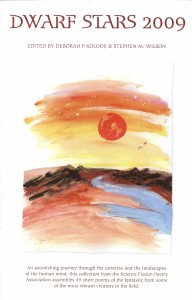Read Write Poem is doing a pretty neat prompt this week: you choose two words, and then go through the dictionary for words between those words (so in the example by Matthea Harvey — who has written more about this method here [pdf] — the words are “terror” and “future” and almost all of the words in the poem start with s, r, q, p, o, n, m, l, k, j, i, h, and g, in that order). Neat challenge.
I’ve had a few publications since my last post: My Poem Rocks published my poem “Self-Sufficiency“; the twitter zine Tweetthemeat published a “horror nanofiction and Nanoism published the first in a three-part serial.
Also, a few market notes:
- I’m still looking for short fiction and poetry of 140 characters or less for Seven By Twenty. I encourage reprints, and that length is perfect for haiku, senryu, and most cinquains. I also want prose poetry, and honestly if a line or two from a longer poem stand alone and you want to submit them, I don’t care if they’re part of a longer work – and your bio can link to the longer work if it’s been published online. The point of this for me is to expose people to some cool work and authors, not to be the first to publish something.
- The editor of Rat’s Ass Review mentioned to me yesterday that he’s still looking for poems for his second issue.
![]() New short-form poetry market microcosms has just published one of my scifaiku as their first-ever piece on twitter. What an excellent way to kick off NaPoWriMo! I haven’t started writing yet, but anticipate spending a lot of time tonight trying my hand at more haiku, both with traditional subjects and speculative ones.
New short-form poetry market microcosms has just published one of my scifaiku as their first-ever piece on twitter. What an excellent way to kick off NaPoWriMo! I haven’t started writing yet, but anticipate spending a lot of time tonight trying my hand at more haiku, both with traditional subjects and speculative ones.